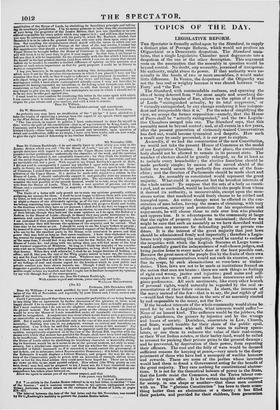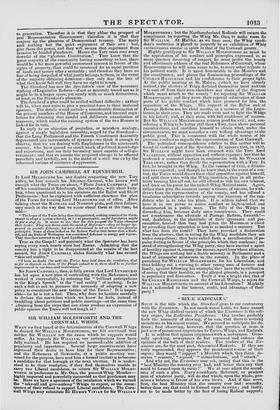TOPICS OF THE DAY.
LEGISLATIVE REFORM.
THE Spectator is formally called upon by the Standard, to supply a distinct plan of Peerage Reform, which would not produce an Oligarchical or a Democratic despotism. The Standard main. tains, that a single Legislative Chamber must degenerate into a despotism of the one or the other description. This argument rests on the assumption that the assembly in question would be beyond control. No doubt, any assetnbly, possessed of irresponsi- ble authority, might abuse its power. If that authority were no- rninally in the hands of two or more assemblies, it would make little difference. In Venice, the despotism of the Oligarchy was not the less real or weighty because it was shared between " the Forty" and " the Ten."
The Standard, with commendable coolness, and spurning the idea of being deterred from " the most ample and searching dis- cussion " by the impulse of fear, allows us the option of a House of Lords " extinguished actually, by its total suppresion," or " virtually extinguished, by any change rendering it less indepen- dent and irresponsible than it is." For the sake of simplifying the view, we accept the former supposition—namely, that the House of Peers shall be " actually extinguished," and the two Legisla- tive Chambers merged into one. The Standard says, that this assembly must be beyond control ; and, at all events in a few years, after the present generation of virtuously-trained Conservatives has died out, would become tyrannical and despotic. How such a result may be easily prevented, it is our part to explain. Assuredly, if we had the construction of the new Constitution, we would not take the present House of Commons as the model of our Legislative Chamber. In the first place, the constituent body should not be allowed to remain in its present state. The number of electors should be greatly enlarged, so far at least as to include every householder ; the elective franchise should be made perfectly simple; by means of the sacred shield of the ballot we would secure the perfectly free exercise of the fran- chise; and the duration of Parliaments should be made short and certain. An assembly so constituted would represent the great majority. What could it represent but the broadest interests of the whole nation? To suppose that the acts of a body so consti- tated, and so controlled, would be hurtful to the people from whom it derived its authority, is inconceivable, except upon the mon- strous notion that mankind would freely choose to be robbed and trampled upon. An entire change must be effected in the con- stitution of man before, having the means of obtaining, with very slight exertion, security and protection for his acquisitions and enjoyments, he will choose those to rule over him who plunder and oppress him. It is advantageous to the community at large that the rights of property should be maintained; therefore we might be sure that such an assembly as we have described would not sanction any measure for defrauding public or private cre- ditors. It is the interest of the great majority that just laws should be administered firmly and impartially ; therefore a Legis- lature truly representing the majority, would be careful to eschew the iniquities with which the English Statutes at Large teem— would carefully guard the independence of well-chosen judges, and bring justice home to every man's door at the least possible cost, Because the great mass of the people live by the fruits of their own industry, their representatives would not curb its exercise, or con- fine its scope, by such abominations as corn-laws or timber- duties. Then, laws are not to be made or institutions framed on the notion that men are brutes : there are such things as feelings of right and wrong, justice and injustice; good name and self- respect are dear to us all ; some men have consciences and reli- gious preferences. All such sentiments, like every other branch of personal rights, would naturally be regarded by the real le- presentatives of their fellow citizens. In short, the interests of the many instead of the few—that is to say, the just rights of all —would find their best defence in the acts of an assembly elected by and responsible to the many, not the few. If the broadest interests of the whole community would alone be.. cared for by such a Legislature, what interests would suffer ?— None of an honest kind. The sufferers would be the jobbers, the public plunderers, the gainers by injustice and by the wrongs and losses of society. Doubtless, sinecurists in Law, Church, and State, would tremble for their share of the public spoil. Lords and gentlemen who sell their votes to railway specu- lators, or use them to enhance the value of their coal-mines, or their West Indian estates, or their barley-land, would be called to account for pushing their private gains to the general damage; and be prevented, by deprivation of their power, from repeating their offences. The cost and the folly of wars would be deemed sufficient reasons for keeping at peace,—very much to the disap- pointment of those who have had a monopoly of warlike honours and rewards. These are some of the parties whose interests would lead them to dread a Government acting for the benefit of the great majority. They care nothing for constitutional abstrac- tions. It is not for the theotetical balance of power in the State, that the Lords resist the Commons, and the Tories labour con- tinually to regain office. It is for certain tangible advantages— for money, in one shape or another—that these men contend with us. The "glorious Constitution" has been to them some- thing better than an abstraction or a theory; it has filled their pockets, and provided for their children, from generation to generation. Therefore it is that they abhor the prospect of real Representative Government; therefore it is that they conjure up the phantom of Democratical tyranny. The many seek nothing but the quiet enjoyment of their own ; but, give them the power, and they will secure that enjoyment from invasion by banded plunderers. Hence the Tory tears over every downfal of the "glorious Constitution." They know that the great majority of the community having something to lose, there would be a far more powerful permanent interest in favour of the rights of property, than could be mustered for an equal partition of lands and money after a scramble ; and therefore they have no fear of being despoiled of what justly belongs to them, in the event of the majority obtaining dominion—they only fear the loss of what they know full well they have no right to retain. The Standard has now the Spectator's view of the necessary working of Legislative Reform—if not so minutely traced out as it might be in a larger space, yet surely with as much distinctness, at least, as the Standard's phantom.
The details of a plan could be settled without difficulty ; as they will be, when men unite to give a practical force to their matured opinions. The details would include a considerable diminution of the present numbers of the House of Commons, and internal regu- lations for obtaining that careful and deliberate examination of measures, which under the existing system of the two Houses is looked for in vain.
In reply to an objection of prejudice, or mistaken analogy, against a single legislative assembly, urged by the Standard— that the Long Parliament and the French Constituent Assembly degenerated into instruments of tyranny—we think it enough to observe, that we are dealing with Englishmen in the nineteenth century, who have gained no small stock of political knowledge and experience, and are daily becoming more capable of self-go- vernment; and that we assume the proposed change to be effected peacefully and lawfully, not in the midst of a civil. war or by the infuriated victims of centuries of oppression.



























 Previous page
Previous page